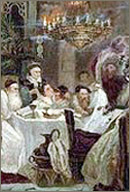Out of the Well of the Past

Jewish history was once regularly portrayed as a march from pre-modern stasis to modern revolution and change. This picture held its attractions, offering clearly marked battle lines for later proponents on either side of the ongoing ideological struggles between traditionalists and modernizers. By now, however, we have been well instructed in the deceptive simplicity of all such efforts to impress order on the relentless flux of history, which so often dissolves the closer we look at it.
The hard task is to create a meaningful picture of the past that simultaneously honors complexity and yet provides coherence. Following on the many recent studies of multiple dimensions of early modern Jewry is a new work of synthesis, Early Modern Jewry, by David Ruderman, a scholar of Renaissance Judaism and Anglo-Jewish thought. Ruderman's learned and fluently written book presents a thought-provoking interpretation of the period beginning with the Spanish expulsion of 1492, which set into motion the extraordinary communities of Iberian Jewry—and much else besides—and stretching forward to the onset of modernity.
In Ruderman's view, this period was marked by a number of definable elements—among them geographic mobility, new forms of communal organization, and printing—that eroded rabbinic authority while facilitating the emergence of new identities. New forms of community took hold in disparate places from Italian ghettoes, to the self-governing community of Amsterdam, to the regional organizations and court Jews of Germany, to the diffuse kahal system of Ottoman Jewry, to the parliament-like Council of the Four Lands that presided over Polish Jewry from 1580 to 1764. Discrete though they were, all exhibited a common feature: vigorous power struggles between lay leaders and rabbis over decision-making authority, with the latter usually losing.
The rabbis were also losing control over the texts, their most precious asset. Publication in print of the elegant commentaries of medieval Spain made for a conceptual revolution in European study of the Talmud, the effects of which are felt to this day. The printing of the Zohar and other mystical texts opened up what until then had been esoteric traditions; new halakhic manuals lessened the need for regular consultation with rabbis; the printing in 1578-80 of Joseph Karo's authoritative law code, the Shulhan Arukh, along with the equally authoritative glosses of Moses Isserles, merged at a stroke the Sephardi and Ashkenazi legal traditions, marginalizing local variants and working a new fixity in Jewish law.
Book peddlers, itinerant scholars, and writers also did their part in carrying knowledge and culture beyond familiar horizons. Another deeply consequential group were the conversos: Jews who had lived as new Christians in pre- and post-expulsion Iberia and whose complicated loyalties, and mix of inner lives and external practice, were new and unsettling in their time (however familiar they seem to us today). The great Sabbatian heresy of the mid-17th century, emphasized by the scholar Gershom Scholem as a founding event of Jewish modernity, emerges here as the embodiment and consequence of several of these processes—which is why it was so vigorously hunted down by rabbinic authorities through the 18th century.
Ruderman's wide-angle perspective on early modernity elongates its trajectory almost to the end of the 1700's. Parting company with historians who offer a date earlier in that century for the onset of the Haskalah, or Jewish Enlightenment, he argues that in some key places the transition to modernity would be deferred even longer by deleterious shifts in the surrounding political environment, including the "limited successes of civil emancipation . . . and the subsequent use and misuse of Jewish minorities as tools of 19th-century nationalism." Modernity also became the subject of internal Jewish struggle, as the Haskalah sought to mobilize, politicize, and institutionalize the ambient cultural milieu.
The crystallization of what had hitherto been a sort of post-1492 Jewish humanism into a deliberate program to reform and Europeanize Jewish society does seem to have marked a crossing point. But no less significant for the emergence of modernity is something well-articulated by Adam Ferziger in his study of 19th-century German Orthodoxy: the historically unprecedented emergence of Jews living openly outside the ambit of Jewish law while maintaining their Jewishness.
In vividly demonstrating the fascination of these Jewish centuries and their relationship to wider historical currents, Ruderman duly notes that the richly textured atmosphere of early modernity calls into question "extreme dichotomies" of modernity versus the past. There is of course radical change in history; humanity being what it is, there is much continuity as well. Only, they are often not what, or where, we think they are.
EASY
Comments are closed for this article.




